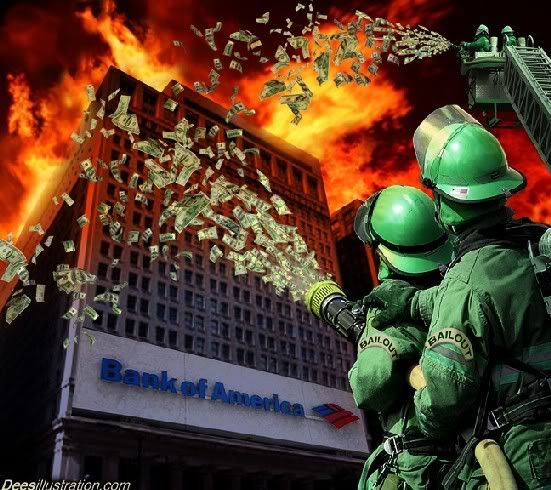Justin Fox discusses the classic question surrounding losses – who pays? – in the context of bank bailouts.
The Great Bond Bailout
By Justin Fox, courtesy of TIME Magazine

You’re ticked off about the bank bailouts. Furious. You think somebody — other than you and your fellow taxpayers — needs to pay. Let’s try to work out who that somebody ought to be.
The banks’ shareholders don’t make a promising target. The stock prices of Citigroup and Bank of America, to name two especially dramatic examples, are down more than 90% from their 2007 peaks. There are arguments, relating to incentives for executives and future shareholders, for wiping out current shareholders at the most troubled banks. But that won’t pay for anything — the shareholders simply don’t have much more value to cough up. Same goes for those who work in the business. Many have lost their job and life savings, and most have seen their salary cut. Yes, there have been egregious bonuses and golden parachutes — and we ought to claw them back — but that won’t pay for a trillion-dollar (or more) bailout. Which leaves … the folks who loaned the banks money. The banks’ creditors have been the clearest beneficiaries of the bailouts — leaving them with the most wherewithal to contribute. (See 25 people to blame for the financial crisis.)
Who are these creditors? The biggest group, with outstanding loans of about $9 trillion, is depositors like you and me. When you deposit money, you’re lending it to the bank. Those deposits were explicitly insured by the Federal Deposit Insurance Corporation (FDIC) up to $100,000 before the crisis, and the banks paid for that insurance (though not in full, given that FDIC coverage has been raised to $250,000 and seems effectively without limit at bigger banks) and passed the cost on in the form of lower interest rates than on, say, an uninsured money-market account. That, plus the fear that panicked depositors could start a devastating run on the banking system, explains why we’re going to continue to be protected. (See the worst business deals of 2008.)
But banks also borrow on wholesale markets, mainly by issuing bonds. About $2.6 trillion of bank funding in the U.S., 20% of the total, comes from such debt securities, according to the FDIC. At the most troubled of the big banks, Citigroup, the figure is 27%. (Citi’s domestic depositors account for just 16% — its main deposit base is overseas.) These bank bonds are mostly in the hands of large, sophisticated institutional investors — pension funds, insurance companies, mutual funds. It may be too much to ask small depositors to monitor the risks at the banks where they put their money and pay for getting it wrong. But these bond buyers are pros. If there is to be any market discipline of risk-taking by banks, bond investors ought to be the ones who enforce it by withholding their cash from the bad apples — and paying the price for misjudgments. Plus, a few concessions from creditors could ease the burden on taxpayers dramatically. If Citi’s $486 billion in wholesale debt were converted into common shares — admittedly a pretty extreme solution — the company’s balance-sheet woes would evaporate. Which is why these arguments have been gaining in popularity. "I think it’s very important that the creditors in this crisis take a hit," said New York University finance professor Matthew Richardson at an NYU conference in March. "We need to try to transfer some of the risk from taxpayers to the financial system."
Sounds awfully logical. So why haven’t we stuck it to these guys? Because we’re afraid they’ll panic. "Unfortunately, we’ve built a system where if you hammer those guys hard, you’re going to have a global credit collapse," said Simon Johnson, a former chief economist of the International Monetary Fund who teaches at the Massachusetts Institute of Technology and whose blog, Baseline Scenario, has become essential reading for crisis buffs. The Federal Reserve and Treasury left creditors at Lehman Brothers adrift in September, and the repercussions were so dire that regulators resolved not to let such a thing happen again.
The FDIC can wind down banks in a more orderly fashion than occurred at Lehman. But FDIC chairwoman Sheila Bair and Fed Chairman Ben Bernanke have both said they don’t have the authority to wind down global financial conglomerates like Citi. The upshot: "If you want to have no more Lehmans, then inevitably you wind up guaranteeing the banks’ debts," said John Hempton, a money manager and former Australian treasury official whose Bronte Capital blog has become another crisis must-read. That is, an orderly reorganization of the financial system in which creditors make sacrifices would be great. But it’s not really an option. So we keep bailing them out.


